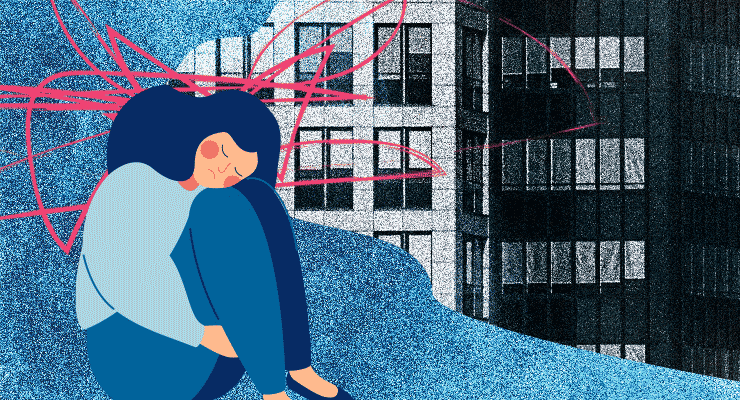
Despite being a majority female workplace, staff at the federal Attorney-General’s Department (AGD) — the department responsible for implementing gender equality laws and protections against sexual harassment — have reported high rates of sexual harassment.
Staff were surveyed in April this year, with the results obtained under freedom of information by Guardian Australia. Most of the 565 respondents — around a quarter of the entire department — were women.
Nearly 12% of respondents said they had experienced sexual harassment at work, with a further 7.6% saying they weren’t sure if they had. Forty percent of victims did not report their harassment, and of the 34 respondents who did, just 17% were satisfied with the department’s policies and procedures.
The survey also found:
- 16% of staff reported hearing sexually suggestive comments or jokes
- 10% reported intrusive questions about their private life
- 10% reported intrusive comments or jokes about their physical appearance, and
- 5.9% reported inappropriate and unwelcome touching.
In 2020, 66% of staff who worked at the department were women. The high rates are surprising and likely mean harassment is perpetrated by a handful of men.
Sex discrimination commissioner Kate Jenkin’s landmark report into workplace sexual harassment found abuse is more likely to occur in male-dominated industries. The Respect@Work report also found 64% of respondents were sexually harassed by a single harasser. Only one in three incidents of workplace sexual harassment are currently reported.
Harassment often doesn’t just happen once, with half of victims nationally experiencing the same type of harassment more than once, and 45% saying the harassment had continued for more than a year.
Young workers, LQBTIQ workers and workers with a disability (along with Aboriginal and Torres Strait Islander workers, those from culturally and linguistically diverse backgrounds, and migrant workers) are more likely to experience workplace sexual harassment.
Eight percent of the department’s staff have an ongoing disability and 9% identify as part of the LGBTIQ community. Of the 8% of staff who reported experiencing discrimination in the workplace in 2020, 42% said the discrimination occurred because of their gender.
Sexual harassment can lead to anxiety, depression and post-traumatic stress disorder and cause distress among employees. At the department, nearly 40% of staff said they felt burned out by their work.
The departmental survey results are consistent with results from across the industry, with a Community and Public Sector Union report released earlier this year finding 16% of respondents experienced workplace sexual harassment. Again, just one in three complaints were reported to their manager, with many respondents feeling the agency wouldn’t deal with their complaints appropriately.
The Morrison government has been slow to respond to the prevalence of sexual violence both across the country and within the public sector. The Respect@Work report was ignored by the government for more than a year and only responded to after public pressure following Brittany Higgins’ allegation of rape and historic rape allegations against the then-attorney-general Christian Porter.
The Respect at Work Amendment Bill was passed in September though adopted just half of the 12 possible legal amendments. A recommendation to include a positive duty of care into the Sex Discrimination Act to ensure employers prioritised protection instead of waiting for individuals to complain was abandoned.
Training to deal with sexual assault, bullying and harassment in Parliament consists of one hour of face-to-face learning and is optional for MPs. A new mandatory training video for parliamentary security staff runs for just 13 minutes and was not watched by senior staff at the Department of Parliamentary Services before being approved.
In a letter to staff, the AGD’s sexual harassment review steering committee chair Sarah Chidgey said the numbers were “much higher” than the reports submitted to human resources, showing a trend of underreporting.
The AGD did not respond to Crikey’s request for comment by deadline.
If you or someone you know is impacted by sexual assault or violence, call 1800RESPECT on 1800 737 732 or visit 1800RESPECT.org.au. In an emergency, call 000.








It would be interesting to see a gender breakdown of the top 3 levels of management, and whether these senior positions are skewed towards men.
The two likely catalysts for a sexual harassment problem in a female-majority department (assuming male-to-female harassment, which is much more common than female-to-female) is the existence of a misogynistic culture, and relationships with a power imbalance. Both of these suggest male majorities in management.
Culture . Fish rot from the head down
Why assume the harassment is coming from men? There is no evidence to support this.
I always feel left out when reading about sexual harrassment. Bullying is a form of harrassment and I have had that by the truckload. Marginalisation, belittling, false accusations, denial of natural justice, procedural unfairness, defamation.
Anywhere, any time an insecure male boss feels threatened, life gets ugly. HR exists simply to protect the organisation. If you don’t have evidence it’s just he said she said. There’s not much one can do about abusive bosses, especially when you don’t even know they are lining you up for a major take down, and you only find out at the last moment.
Failing to provide a safe work environment and reckless endangerment. Those two charges should be getting a thorough work out in Australia.
It’s clear that the big swinging dicks don’t see this as a problem. As with everything, they just provide lip service, but other then that, women shouldn’t be so hysterical when they get some attention from a man, what’s the big deal?
Its unwanted attention. Perhaps you would have a different attitude if some hit on you, doped you with Rohypnol and shoved a coke up your clacker.
Lip service to the “big swinging dicks”?
I’m not sure you realise the etymology of the word “hysterical”.. or maybe this is all sarcasm.
With a cabal of sexist authoritarians like Morrison, Joyce, Porter, Dutton and Robert at the top of government, the extent of sexual harassment in the APS is unsurprising.